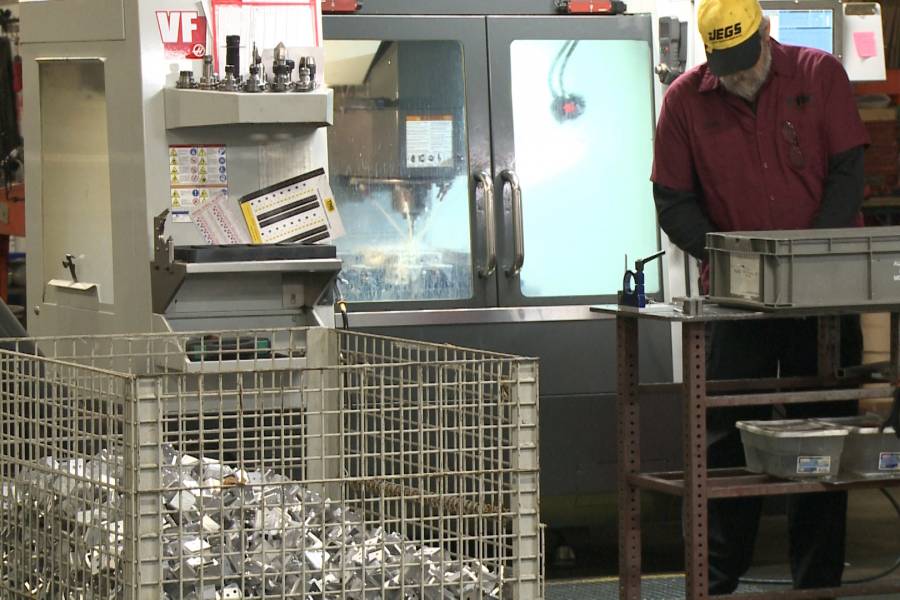 Tomlinson Manufacturing operates out of a relatively small building in Indianapolis. (Lindsey Wright/WFIU-WTIU News)
Tomlinson Manufacturing operates out of a relatively small building in Indianapolis. (Lindsey Wright/WFIU-WTIU News)
Indiana Gov. Eric Holcomb has called workforce development the state’s Achilles heel. He’s made growing the state’s pool of skilled workers a top priority since he took office.
But it’s not the kind of problem you can fix overnight. One of the many hurdles employers find themselves up against is a complicated one.
Tomlinson Manufacturing: "We make stuff"
At Tomlinson Manufacturing, the motto is simple: “We make stuff.”
"Small parts components out of aluminum, a myriad of steels, and then plastics," says Administrative Manager Toni Tomlinson. "There’s a ton of industrial plastics we’ve gotten into too."
Tomlinson operates out of a relatively small building in downtown Indianapolis. Even though it’s a small company, Tomlinson says she has a hard time finding the skilled employees she needs.
"I need theoretically at least two more people," she says. "I need those people so they can float back and forth, everyone can check, it needs to be a team. I do not have that now."
Tomlinson has tried to recruit skilled workers at trade schools and job fairs, but there’s just not enough interest. On top of that, Tomlinson says there’s a serious lack of critical thinking and math skills.
Drug epidemic complicates workforce practices
The Indiana Department of Workforce Development estimates there will be more than a million jobs to fill in the state in the next five years.
So, there aren’t enough workers and those who are interested often don’t have the skills.
But let’s add another barrier into the mix. The drug crisis is not only tearing families apart, ravaging communities, but it’s exacerbating the workforce shortage.
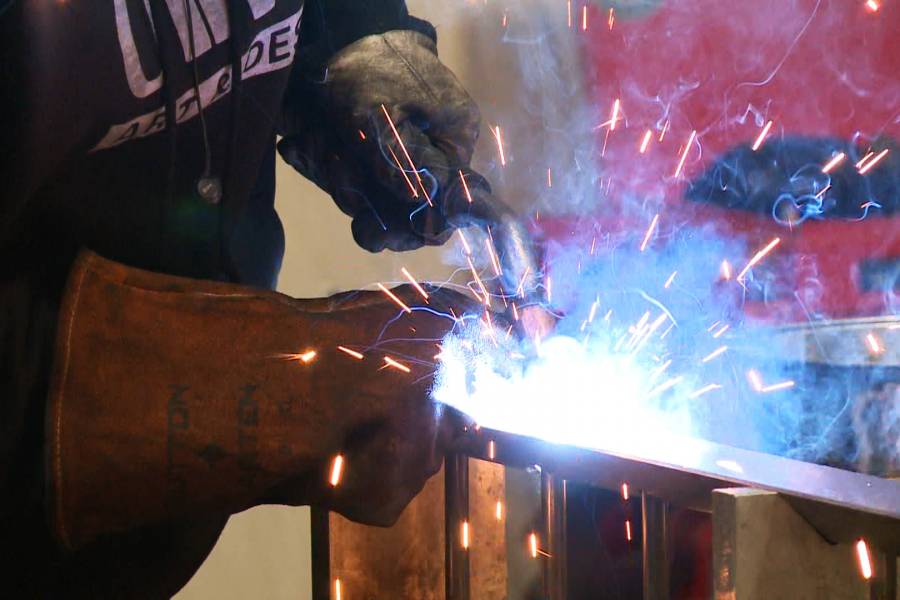
Quality Fabricated Solutions operates out of the same building as Tomlinson Manufacturing. (Lindsey Wright/WFIU-WTIU News)
Quality Fabricated Solutions President Charley Powers say it’s a complex issue.
QFS operates out of the same building as Tomlinson, and the workers make a little of everything using laser cutters and welding practices.
Powers says he typically brings on people who have no former training because it’s hard for him to compete with larger companies, and he loses some potential workers when they find out QFS does random drug testing.
For current employees, it’s not necessarily a one and done policy at the company. Powers says it depends on the situation, but his goal is to give workers another chance.
"It’s very expensive to train, so it’s cheaper for me to work with somebody, try to help them, than it is just to say you’re done and bring somebody else in and start that training process over," Powers says.
But balancing those efforts with safe working practices can be difficult.
"It’s my job as the owner of the company to make sure that everybody else has a safe work environment, right, not just the other employees but themselves," he says.
Company trying new approach with Pathways to Employment
Leaders of Belden, a transmission company in Richmond, are going to even greater lengths to address the challenges with drugs.
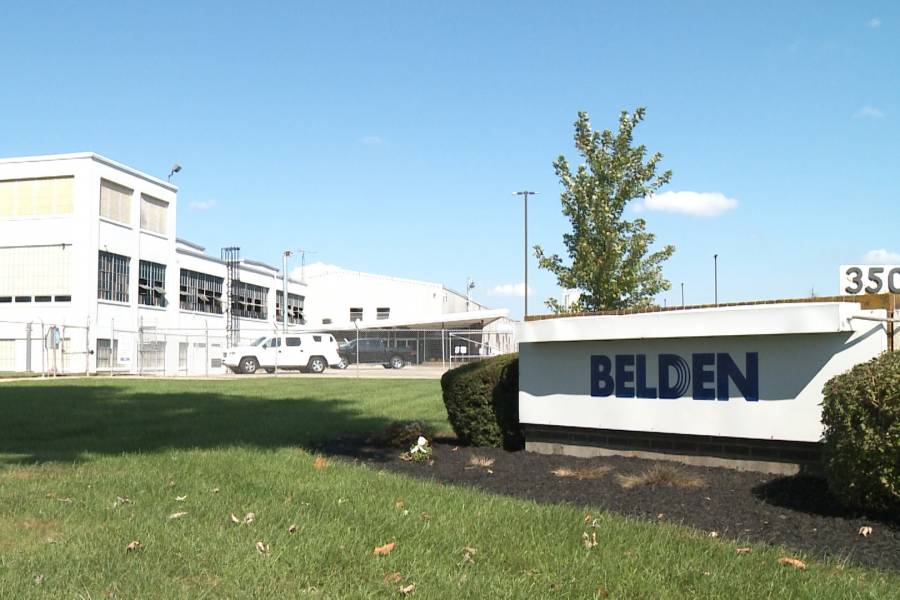
Belden launched Pathways to Employment as an effort to increase the labor pool. (Tyler Lake/WFIU-WTIU News)
Human Resources Vice President Leah Tate says about 10 percent of applicants were failing drug tests.
"So it made us start to take notice, and we need to increase the labor pool, not shrink it," Tate says.
Belden launched Pathways to Employment early last year, which is said to be a first of it’s kind rehabilitation program.
The program takes an individualized approach. If a job candidate fails a drug test, they’re referred to a treatment provider. There, they do an assessment, which determines their risk for substance use disorder.
"Depending on that, they'll have individualized treatment," Tate says. "Once we bring them into the plant and they start working, they start on safety conscious jobs and then after a certain period of time we would allow them to operate machinery."
The employee must pass ongoing drug tests.

Christopher Schrader, president of business consulting firm Schrader and Associates, says because of the shortage, companies are tapping into populations they previously wouldn’t have, like kids out of high school or people with criminal records. It's something he's had to start recommending businesses do to ease the need for workers.
He says Belden is doing the same thing.
"I personally applaud them," Schrader says. "It’s a risk, to be certain, and the risk must be acute because they’re taking the risk on the front end."
Unfortunately, Schrader says there are no easy answers. That's something Tomlinson is learning.
Holcomb has launched programs through his Next Level Jobs Initiative that, for example, reimburse employers for training employees. But it’s difficult for smaller companies like Tomlinson Manufacturing to offer hyper specific training because employees wear so many different hats.
The governor wants to put more money toward workforce efforts this year since it's a budget year, including several million dollars toward computer science training and high school career counseling.
Tomlinson welcomes any efforts the state is making, but she’s accepting the fact there are no quick fixes when it comes to advanced manufacturing’s workforce shortage and the numerous challenges that make it worse.
She says she’d love to get a pool of candidates with experience, but right now the company will settle for workers with the simple desire to make stuff.
 DONATE
DONATE


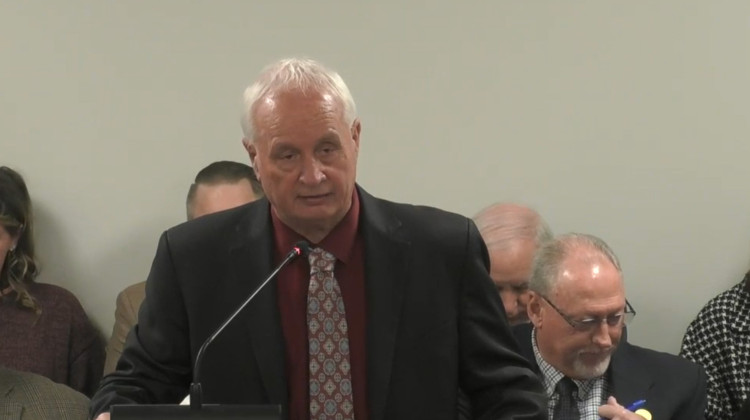
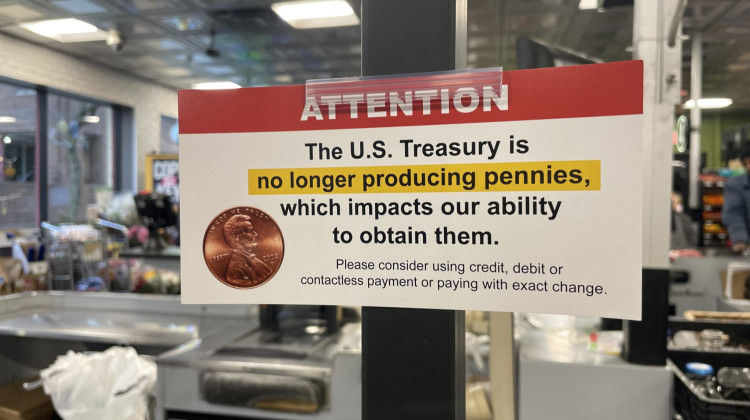


 Support WFYI. We can't do it without you.
Support WFYI. We can't do it without you.